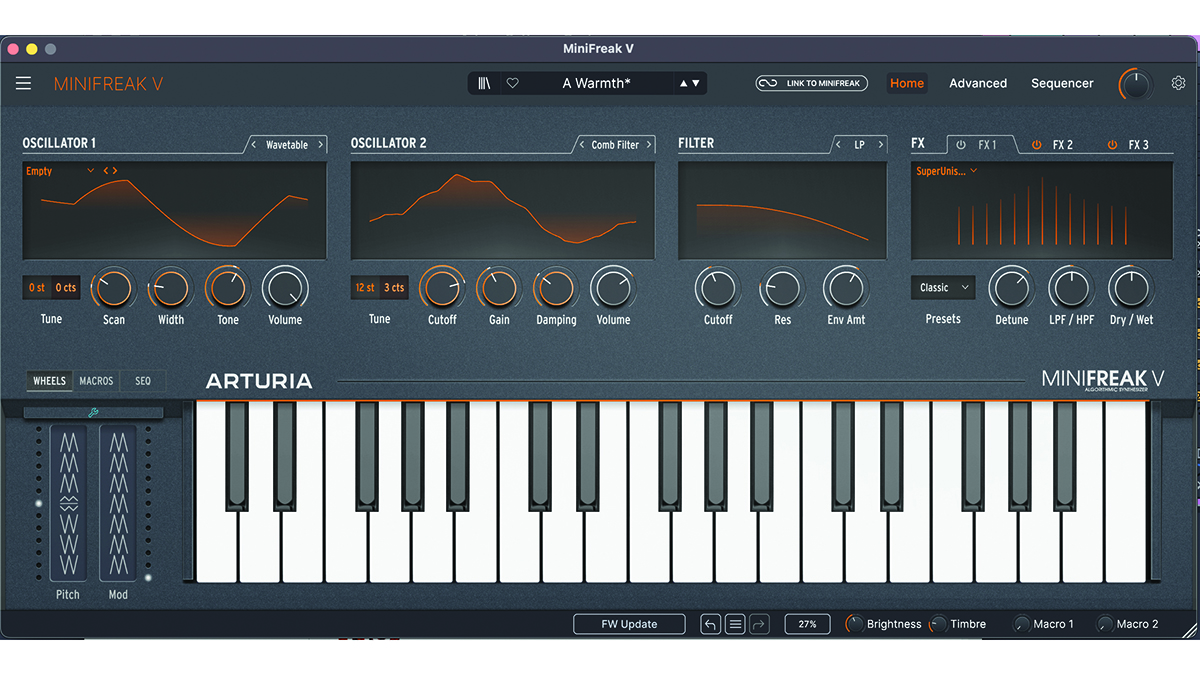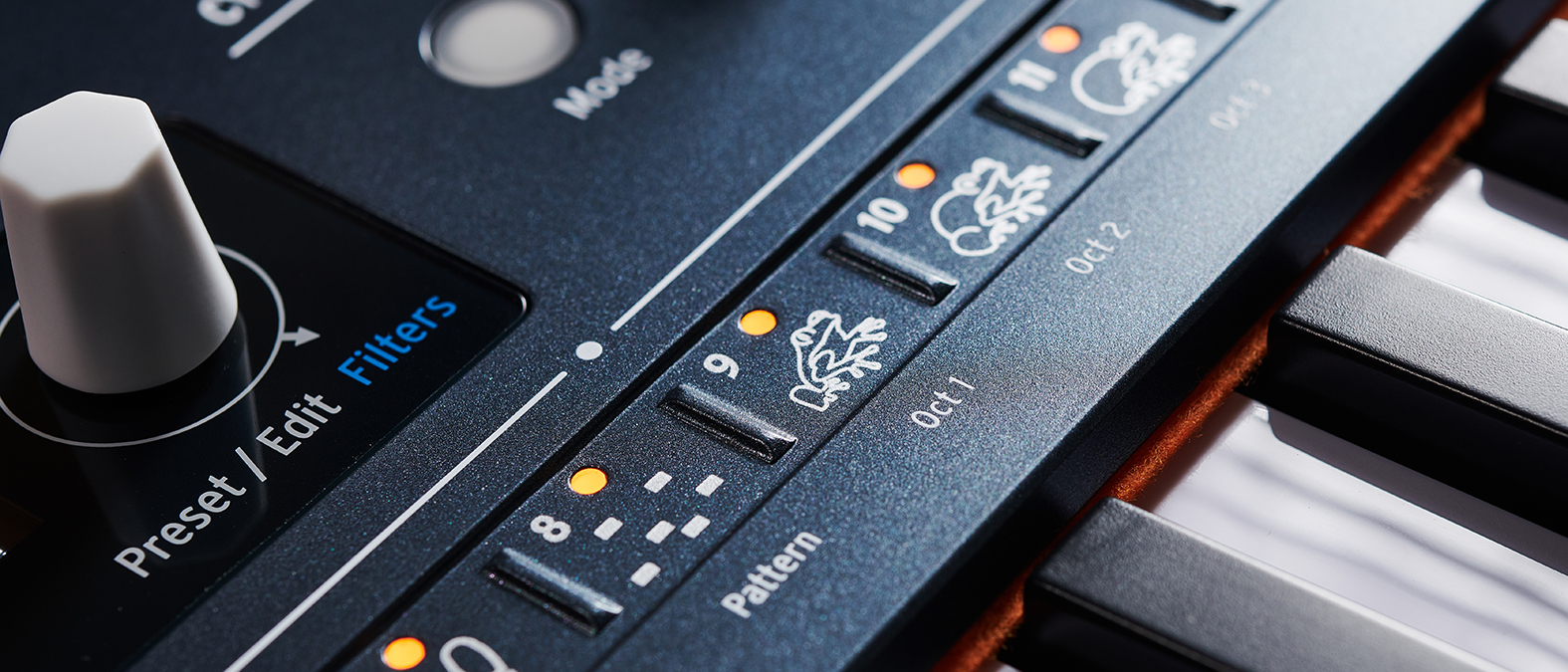MusicRadar Verdict
An impressive free update that adds extra sonic scope and enhanced usability to one of our favourite synths of recent years.
Pros
- +
Wavetable synthesis is a fitting addition to MiniFreak’s workflow.
- +
Super Unison immediately makes patches sound huge.
- +
Varied, quality presets available through MiniFreak V.
Cons
- -
Wavetable functionality is a little simplistic compared to some other synths.
MusicRadar's got your back
Arturia MiniFreak 2.0: What is it?
Easily one of the most significant selling points in favour of hybrid analogue/digital hardware synths is the potential for the instruments to be upgraded throughout their lifespan.
While the purely analogue elements are effectively fixed as-is, anything digital within a synth’s engine is ripe with potential for new features, enhancements or a complete overhaul via firmware updates. It’s something we’ve seen bring exciting new features to the likes of UDO’s Super 6 and Korg’s Minilogue XD in recent years.
Arturia has already proved itself reliable at bringing major enhancements to its existing instruments. Earlier this year, the French brand once again overhauled its hybrid MicroFreak synth with a fifth major firmware update, and now it’s the turn of its bigger and newer sibling, the MiniFreak.

Arturia MiniFreak 2.0: Performance and verdict
MiniFreak’s 2.0 update brings a new oscillator engine along with enhancements to the effects and presets. On the former front, users get a whole new Wavetable engine to play with, which comes stocked with 32 factory wavetables.
As with MiniFreak’s other engines, the Wavetable mode is relatively simplistic. Control is handled by the Type, Timbre, Wave and Shape parameters, as with other engines, which here are used to select the wavetable, scan through the position, alter the pulse width and apply a bi-directional filter, respectively.
What we love is how easy it makes it to mix and match digital synthesis approaches
It’s a slight shame that the engine can only be used in the Osc 1 slot, and that there’s currently no way to upload user wavetables. That said, the simplicity is kind of the point – what we love about the MiniFreak is how easy it makes it to mix and match digital synthesis approaches and tweak the parameters of each.
Wavetable capabilities are a sensible addition too, given MiniFreak’s powerful modulation tools, and the new engine adds a nice extension to the range of tones the synth can create.
The other major addition is a new Super Unison effect, which adds a thick, chorus-like detune. As you’d hope given the name, it immediately makes any patch sound huge, and modulating the time parameter opens up plenty of potential for additional movement.

Of course, MiniFreak exists in two forms – the original hardware version and its software MiniFreak V counterpart, which also gains these new features. Owners of the hardware automatically have access to both, and in fact will be required to install the latest version of the plugin in order to update the hardware. As it happens, for hardware users the MiniFreak V application can act as an incredibly handy tool for managing presets.
Alongside the new firmware, Arturia has also launched a host of new sound packs for use with both versions of the synth. Three of these are free, and worth adding to your library. MiniFreak V is exceptionally handy for testing and auditioning sounds from these, so that you can then transfer your favourites to the hardware. On that note, the 2.0 firmware also adds a new ‘favourite’ option for presets, allowing 64 to be assigned to the sequencer steps for quick access.
MusicRadar verdict: An impressive free update that adds extra sonic scope and enhanced usability to one of our favourite synths of recent years.
Arturia MiniFreak 2.0: Hands-on demos
Arturia
Oscillator Sink
The Unperson
Davide Puxeddu
Arturia MiniFreak 2.0: Specifications
- KEY FEATURES: Update for the hardware MiniFreak and software MiniFreak V. Free for existing users. Price for new users: MiniFreak €599, MiniFreak V €199. Purchase of the hardware includes software version.
- CONTACT: Arturia
I'm the Managing Editor of Music Technology at MusicRadar and former Editor-in-Chief of Future Music, Computer Music and Electronic Musician. I've been messing around with music tech in various forms for over two decades. I've also spent the last 10 years forgetting how to play guitar. Find me in the chillout room at raves complaining that it's past my bedtime.
Brace yourself: Bryan Adams didn’t buy his first real six-string in a five and dime
“Nobody listens to one genre. I literally don’t know anybody who listens to one genre. You can be a fan of so many different artists at once”: Laufey on what Gen Z can teach the rest of us about how to appreciate music
Bon Iver - ranked: from Sable, Fable to For Emma, Forever Ago










